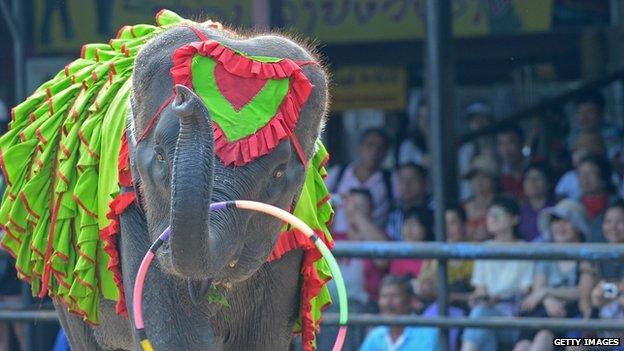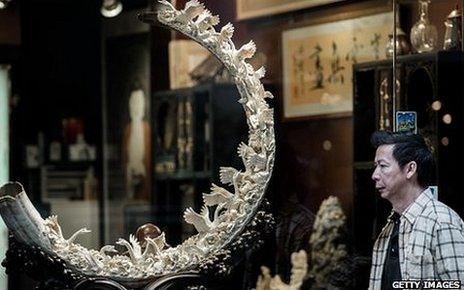Thailand's promise to end ivory trade cautiously welcomed
- Published
- comments

An elephant performs for tourists in Thailand where a legal trade in ivory is said to boost poaching in Africa.
Thailand's prime minister says she will amend her country's laws to ban the legal trade in ivory.
Yingluck Shinawatra was speaking at the opening of the Cites, external conservation meeting taking place in Bangkok,
The legal market in Thailand is said to be fuelling high levels of poaching across Africa.
Critics say that there is a lack of clarity and detail regarding the proposed changes to the law.
There are about 6,500 elephants in Thailand, of which 2,500 live in the wild. Ivory taken from domesticated elephants can be legally sold in the country but campaign groups and scientific experts say that this law is being used to "launder" ivory taken illegally from Africa.
Thailand is believed to be second only to China as a market for tusks, often brutally removed from elephants across the continent. It is estimated that between 50 and 100 African elephants a day are being killed to meet the demand.
Speaking at the opening of the Convention on the International Trade in Endangered Species (Cites) in Bangkok, the Thai PM said that no one cares more about elephants than the people of Thailand.
But she acknowledged that the current system was being abused.
"Unfortunately, many have used Thailand as a transit country for the illegal international ivory trade," she told the meeting.
"As a next step we will forward amending the national legislation with the goal of putting an end on ivory trade and to be in line with international norms."
No further details were given as to the timing and scope of any ban. Some campaigners were delighted with the announcement, saying they understood the proposed changes would protect all forms of elephants including Thailand's wild and domestic elephants and those from Africa.
Stuart Chapman from WWF told BBC News it was a "big occasion."
"We need to see detail in terms of the timeframe but it all starts with a commitment and we've never had that before, today the prime minister made that commitment," he said.
"This is a very important first step."

Ivory is openly sold to tourists throughout Asia but the origins are usually in Africa.
Others though were more cautious believing that Ms Yingluck was talking about curbing the international flow of ivory into Thailand by beefing up a DNA testing programme to validate the origins or tusks.
And with up to 5,000 stores, boutiques and kiosks selling ivory to tourists across Thailand, many believe it will be impossible to stem the trade, whatever the law says.
Philip Mansbridge is the chief executive of the wildlife charity, Care for the Wild. He told BBC news that the PM's intentions were unclear.
"While it is positive that the host country has recognised the size of the ivory issue and the importance of it, we were disappointed by the lack of a clear commitment to banning the domestic trade," he said.
"We don't feel it has gone far enough."
The Cites meeting runs until the 14th of March and will consider 70 proposals from governments to regulate the trade in species including polar bears, rhinos and several different varieties of sharks.
Follow Matt on Twitter, external.
- Published28 February 2013
- Published1 March 2013
- Published29 January 2013